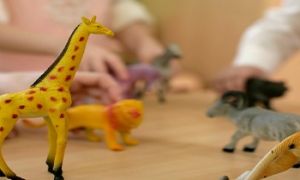

Among the most challenging transitions in early childhood is when children start staying away from their parents for longer periods of time than they have been used to till then. For Educators caring for babies and toddlers who are having a particularly bad time leaving their parents, the following article provides information on What Is Separation Anxiety, Factors that Can Cause Separation Anxiety, Separation Anxiety Signs, How To Manage Separation Anxiety When To Seek Help and more.
While dummies are designed to help comfort and settle children, they are also a potential hazard to infants and young toddlers.
From now, babies begin to identify and respond to their own feelings, understanding other's feelings & needs and interact positively with others. A baby's social and emotional development increases by becoming more aware of other people that are around them and loves the attention they receive.
Babies use of language at this stage changes so much that it's hard to notice all the key changes that occur. By the end of this period a baby has transformed from non-verbal communicator into an active talker.
Babies will begin to find new ways of moving themselves around the house and has improved balance and body movements. These movements that a baby displays are often referred to as gross motor development.
Babies will spend most of their time watching the world around them, taking in information, getting directly involved and often combining both touch and sight which is often referred to as fine motor development.
A baby’s cognitive development at this stage is very rapid and many changes take place over this time. They’re learning new things each day and spend their time observing others to learn how to act. Babies become more curious as they begin to discover their surroundings and begin to engage in a wide variety of experiences.
Your baby has just turned one…they are definitely growing up fast and it’s time to give a variety of different foods to your little one. From now on, the foods you give your baby during breakfast, lunch and dinner will begin to replace milk as the main source of nourishment. At this stage milk will only provide half the calories and nourishment needed for your growing baby.
As soon as your baby's first tooth emerges and followed by the rest of the teeth, it is important to begin cleaning it – regularly twice a day, morning and at night after the final feed. Most babies “grow” their first tooth at around 4 -6 months of age. Sometimes a tooth can appear without any warning signs at all and sometimes you may notice a small bulge on the gum or a red patch on the gum or cheek, followed in a couple of days by a tooth.
It's so exciting to notice your baby's very first tooth coming through. Most babies “grow” their first tooth at around 4 -6 months of age. Sometimes a tooth can appear without any warning signs at all and sometimes you may notice a small bulge on the gum or a red patch on the gum or cheek, followed in a couple of days by a tooth. However some babies can feel great discomfort during teething,they may be grizzly, wake in the night, dribble more than usual or cry during feeding.
 As an Educator in Australia, your pay rate falls under the Children’s Services Award 2010. This award states the minimum amount that an employer can… Read More
As an Educator in Australia, your pay rate falls under the Children’s Services Award 2010. This award states the minimum amount that an employer can… Read More
 When working as a qualified Early Childhood Teacher (with a university degree) within a service, your rate of pay will come from the Educational Services… Read More
When working as a qualified Early Childhood Teacher (with a university degree) within a service, your rate of pay will come from the Educational Services… Read More
 When working as a Diploma Qualified Educator your pay rate is from the Children's Services Award 2010. This Award states your minimum rate of pay… Read More
When working as a Diploma Qualified Educator your pay rate is from the Children's Services Award 2010. This Award states your minimum rate of pay… Read More
 When working as a Cert 3 Qualified Educator, your pay rate is from the Children's Services Award 2010. This Award states your minimum rate of… Read More
When working as a Cert 3 Qualified Educator, your pay rate is from the Children's Services Award 2010. This Award states your minimum rate of… Read More
 Educational Leaders play a crucial role in their early childhood service by ensuring that the educational program aligns with best practices and supports the holistic… Read More
Educational Leaders play a crucial role in their early childhood service by ensuring that the educational program aligns with best practices and supports the holistic… Read More
 In early childhood education and care, ratios are more than a technicality—they are a frontline safeguard. Every child deserves responsive supervision, emotional connection, and developmental… Read More
In early childhood education and care, ratios are more than a technicality—they are a frontline safeguard. Every child deserves responsive supervision, emotional connection, and developmental… Read More
 With the new national child safety reforms kicking in on 1 September 2025, early childhood services like yours have a real opportunity to lead the… Read More
With the new national child safety reforms kicking in on 1 September 2025, early childhood services like yours have a real opportunity to lead the… Read More
 Here’s a comprehensive Mobile Phone and Smart Watch Policy tailored for early childhood education and care (ECEC) services in Australia, aligned with the latest 2025… Read More
Here’s a comprehensive Mobile Phone and Smart Watch Policy tailored for early childhood education and care (ECEC) services in Australia, aligned with the latest 2025… Read More
 The Sea of Fish Challenge is a national initiative that invites children, educators, families, and communities to create and display fish artworks as a symbol… Read More
The Sea of Fish Challenge is a national initiative that invites children, educators, families, and communities to create and display fish artworks as a symbol… Read More
 Across the early childhood education and care sector, educators are sounding the alarm: current staffing ratios are insufficient to deliver safe, meaningful, and developmentally appropriate… Read More
Across the early childhood education and care sector, educators are sounding the alarm: current staffing ratios are insufficient to deliver safe, meaningful, and developmentally appropriate… Read More

In the early education context, assessment for learning is best practised as a “process of...
See more...
A: Observing a child's interest is key to understanding their passions and learning preferences.
See more...
Congratulations! You're pregnant! Until the little one arrives, some of you will choose to continue...
See more...© 2009-2025 Aussie Childcare Network Pty Ltd. All Rights Reserved.

